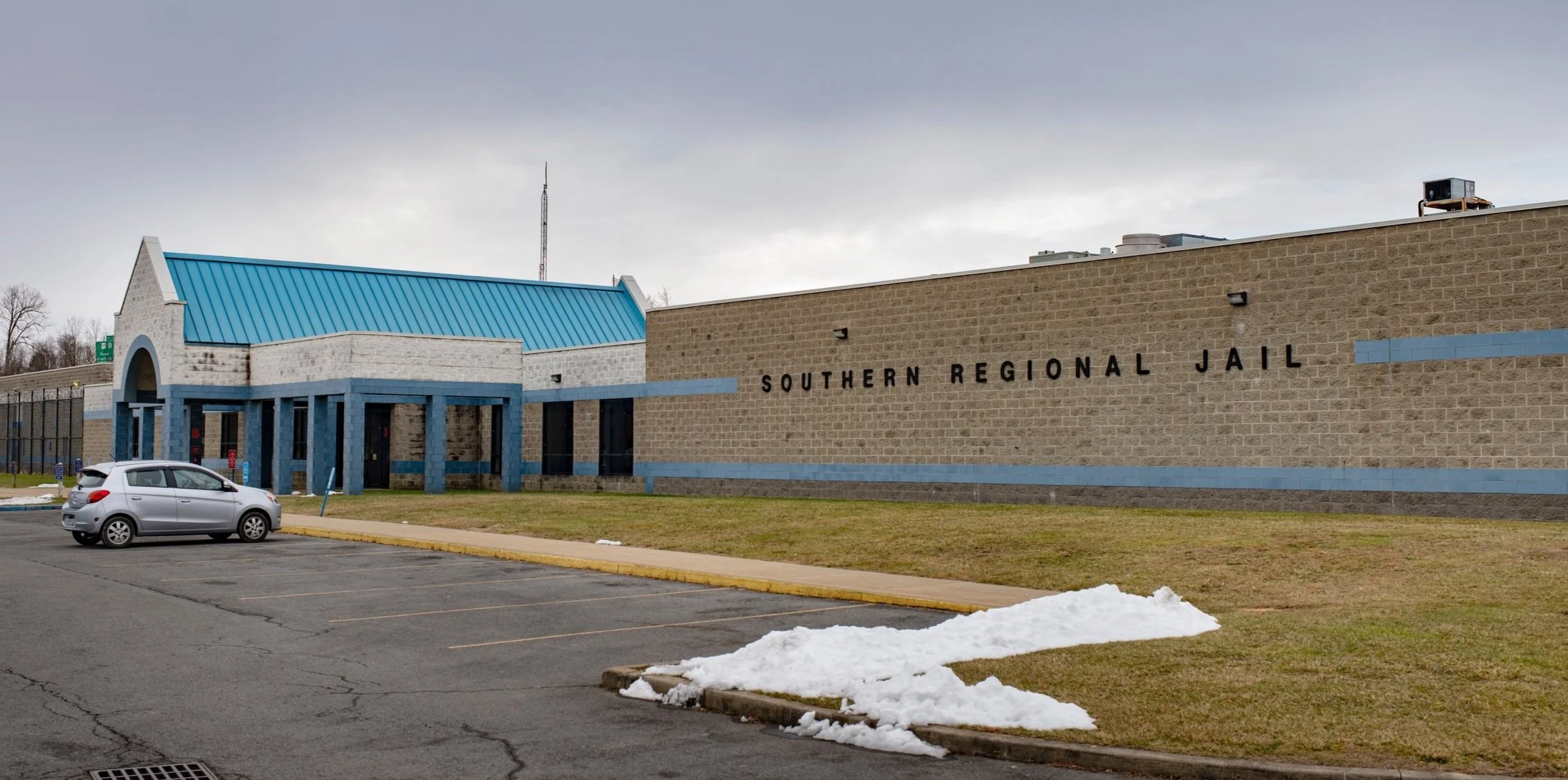W.Va. jails deny detainees the most effective treatment for substance use disorder: their prescribed medication
People who were on Suboxone at the time they were arrested report being denied access to the medication in state jails. Experts say the consequences can be deadly.
Sam McCarty* holds up the medication he was cut off from while being detained in Southern Regional Jail in August 2021. (*Name has been changed to protect privacy.)
Jan. 31, 2021 • Written by Kyle Vass
When Sam McCarty* fell off of a ladder doing work at his parents’ house, he had never taken Percocet. But, after a trip to the emergency room and having surgery for a broken arm, his surgeon prescribed the powerful painkiller and instructed him to take it daily. His doctor continued prescribing refills for nearly two years.
After years of daily usage, McCarty was completely dependent on Oxycodone — the opioid found in Percocet. Cut off from his prescription, he began going into withdrawal and turned to buying Oxycontin on the streets.
“I was using five to six 80mg pills a day — snorting them,” he said.
McCarty’s usage had spiraled out of control. He made several efforts to quit. “I was raised in church. So, I knew it was wrong to be on drugs. I always fought with it,” he said.
After three years and several failed attempts to quit cold turkey, he decided to seek medical help for his opioid addiction. A doctor at a nearby clinic that specializes in treating substance use disorder prescribed McCarty Suboxone — a drug that curbs cravings and blocks opioid receptors in the brain, preventing recreational usage.
“Suboxone saved my life,” said McCarty, who explained that the medicine not only allowed him to avoid the withdrawal process that comes from quitting cold turkey, but it also took away his desire to use.
“Without the urges, I was able to get rid of any types of triggers,” he said.
Surviving America’s deadliest jail system
For seven years, McCarty was able to control his disorder. He passed the weekly drug screenings mandated by his physician and took his medicine. He felt free from the cycle of constantly buying and using opioids, but that freedom was short-lived.
In August of 2021, McCarty took an anti-anxiety medication recreationally. In an incoherent state, he began arguing with his wife about his ability to drive. Desperate for help, she called the police and McCarty was ultimately taken to Southern Regional Jail, outside of Beckley, where he would spend the next 45 days.
At least six people in state custody have died in Southern Regional Jail in Beaver, W. Va. over the least year.
“When I got to jail, they told me I couldn’t have [Suboxone],” said McCarty. Instead of giving him his prescribed medicine, healthcare providers at Southern Regional Jail put him on a detox protocol to wean him off the drug he had relied on for years.
He began the months-long withdrawal process on his first day in jail. “Day 17 and 18, it started hurting deep down in my bones. I had this dull, throbbing pain. No energy; couldn’t eat. I went from 195 pounds down to 170,” he said.
Desperate for a way to stop the pain and constant nausea, McCarty turned to the readily available supply of drugs in the state’s regional jails. He purchased fentanyl — a powerful, synthetic opioid that is currently responsible for the majority of overdose deaths in America. And, despite watching a man overdose from this same drug in jail a week before, he snorted it.
“For the first time ever in my life I did fentanyl,” McCarty said. Until that point, he said he had never considered doing heroin or fentanyl – opting instead for prescription painkillers. In 45 days at Southern Regional Jail, he had gone from seven years of not using opioids to using fentanyl, the most dangerous drug on the market.
When McCarty was released, he said the trauma of being forced off Suboxone stuck with him. He refused to take it again. “After going through those withdrawals, it scared me. It was the most horrible I've ever felt in my life,” he said.
Setting people up to fail
West Virginia is the hardest place in the country to complete a jail sentence without dying, according to reported data on jail deaths. Substandard drug withdrawal protocols — like the kind that was forced on McCarty — are often the cause of such fatalities, said Andrew Klein, senior scientist for Advocates for Human Potential.
“Many jail deaths are mismanaged or non-managed drug withdrawals,” Klein said.
The lack of Suboxone in most jails means the medical staff can’t properly taper people off of it, Klein said. Instead, the medical staff at Southern Regional gave McCarty Clonidine — a blood-pressure medication that isn’t approved by the FDA for medical withdrawal.
According to Klein, this substandard approach is common in jails that don’t offer medically assisted treatment options for substance use disorder. He says the “gold standard” is to slowly taper people off the opioid using either methadone or buprenorphine – the main ingredient in Suboxone.
Withdrawals being poorly managed could be what is driving the abnormally high death rate in West Virginia jails, Klein said.
“When you're withdrawing, you get chronic diarrhea. You can't drink and you vomit. So, you quickly dehydrate. Once you dehydrate — and I'm talking about losing like 50 pounds in two weeks — then your system shuts down. You have seizures, heart attacks — all these things happen.”
According to Klein, the death reports don’t mention the withdrawal process and instead list causes of death that seemingly have nothing to do with drugs.
“You have a seizure, and you fall out of the bunk. So the immediate cause of the death is you hit your head against the wall or the floor, something like that. But the thing that made you have the seizure was the withdrawal.”
Many suicide deaths are associated with substandard withdrawal protocols in jails, Klein said. “Around 40% of suicides are in that first week because that's also when you're withdrawing.”
Klein’s observations are echoed by the Department of Justice, which recently released results of an investigation in a jail in Cumberland County, New Jersey, that found every suicide in the facility was linked to an incarcerated person being denied medicine for opioid withdrawal.
The number of suicides that prompted that federal investigation was six in three years. By comparison, Western Regional Jail in Huntington, WV, saw three suicides in in a period of only eight months starting in September 2020. So far, no federal investigation into West Virginia jails has been announced.
Inconsistencies throughout the state
According to an employee for the West Virginia Division of Corrections and Rehabilitation whose name is being withheld to protect their identity, eight of the state’s 10 jails deny people their prescriptions for opioid use disorder upon incarceration.
When reached for comment, a Division of Corrections and Rehabilitation spokesperson said that all prescriptions deemed “medically necessary” were honored in state jails and denied that people with prescriptions to Suboxone are being refused their medication.
This response seemingly contradicts a plan released by the state health department last year to address the lack of access to medicine for substance use disorder in state facilities.
Jails must comply with ADA standards
Several lawsuits have been filed across the country over correctional facilities denying people medication for substance use disorder — a condition protected under the Americans with Disabilities Act.
In 2019, a federal judge ruled that a woman in Maine couldn’t be denied access to her medication for SUD during her 40-day jail sentence. And, in October of 2021, the ACLU of Michigan filed a lawsuit on behalf of a man awaiting sentencing in a Grand Traverse County Jail on the grounds that the facility violated his Eighth Amendment right to not be punished in a cruel and unusual manner when it withheld his medication.
According to Klein, only about 150 of roughly 3,200 jails across the country offer methadone or Suboxone to patients suffering from substance use disorder. One that does provide such medication is the Fairfax County Detention center in Fairfax, Virginia — about an hour away from West Virginia’s eastern-most border.
Laura Yager, who is the systems transformation director for Fairfax County, said not everyone working for her county’s jail was thrilled about its Medication-Assisted Treatment (MAT) program at first. “It was a challenge to get health care providers and correctional officers to see people with substance use disorder — particularly opioid use disorder — as suffering from a medical illness,” she said.
Yager teamed up with the county’s Sheriff, Stacey Kincaid, to radically overhaul how the jail offered treatment to incarcerated people. She said despite initial pushback, county leadership decided to get ahead of the nationwide trend of courts mandating jails to provide medical treatment for substance use disorder as a disease.
“Do it now under your own terms, and figure out what works for you, or have it done to you,” Yager said. More importantly, incarceration provides states with a rare opportunity to make a connection with people who often slip through the cracks.
“It's cruel and unusual punishment if you don't treat chronic disease in a jail or in a prison,” Yager said. “We have this golden opportunity to make a meaningful connection when someone comes through our doors. Why would we pass that up?”
Since the program began in July 2020, Yager said 10 to 12 percent of the more than 600 people held in Fairfax County Detention Center are enrolled in the MAT program.
Yager credits her local law enforcement leaders and correctional officers for being willing to give it a chance, calling it a model for other jails struggling to find treatment options for the ever-growing number of people coming in with opioid use disorder.
While Yager said she understands change doesn’t happen overnight, she had the following advice for any jails experiencing high rates of overdose and withdrawal death. “If someone comes in on Suboxone, why don't you start by agreeing to continue that treatment? That’s the easiest thing you can do.”
Yager tells other jails that are striving to do better to consider the legal ramifications. “Just start looking at the litigation across the country. You're not going to win,” Yager said.
Missed opportunities at home
The model MAT program that began in Fairfax County two years ago was started with a single $150,000 grant.
The West Virginia Division of Corrections and Rehabilitation was awarded a $1.9 million federal grant for the express purpose of developing MAT programs in all of its regional jails. Before that grant expired in 2019, WV DCR had only spent $248,000.
After returning $1.6 million in unused grant money, WV DCR saw 12 people die from fatal overdoses in its jail system in 2019.
Multiple requests for comment about why the grant went mostly unused to WV DCR were unanswered.
Over the past three years, at least 58 people have died in West Virginia jails from various causes – 45 of them died before making it to trial. How many of these deaths were related to mismanaged or non-managed drug withdrawals isn’t publicly known.
Reflecting on the possibility of having to go through the experience of forced withdrawal from Suboxone again, McCarty said, “After last time, I’m terrified about going back in and not being able to stay on Suboxone. I barely made it last time.”
* The name Sam McCarty is a pseudonym used to protect a source’s identity. Dragline sometimes agrees not to identify people who provide information for our articles. McCarty authorized Dragline to access his medical and jail records to verify his claims. Under our guidelines, anonymous sources are only used for information that we think is newsworthy and credible, and that we are not able to report any other way.


